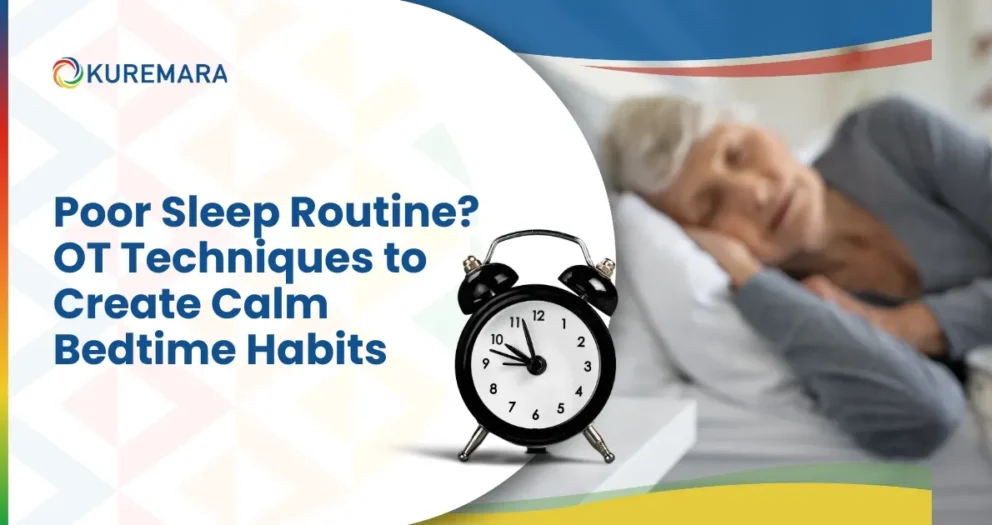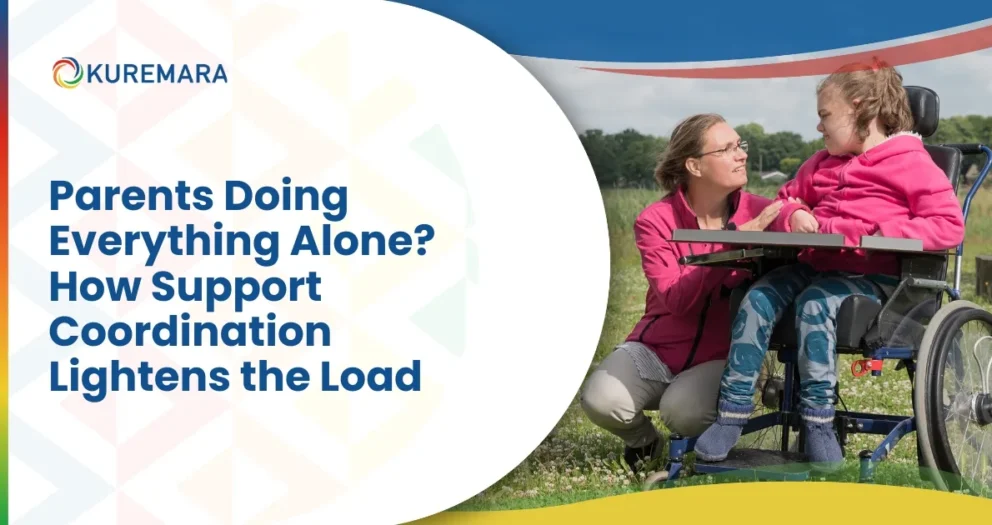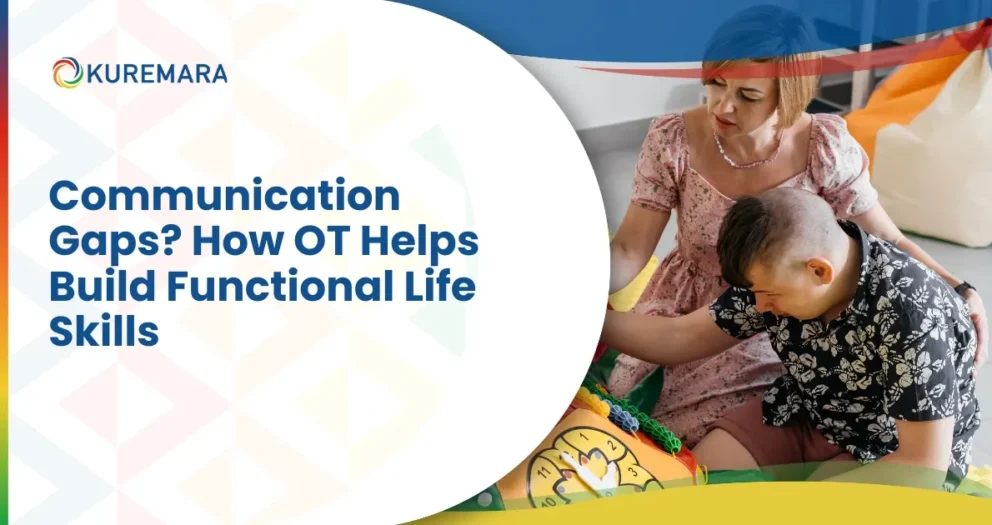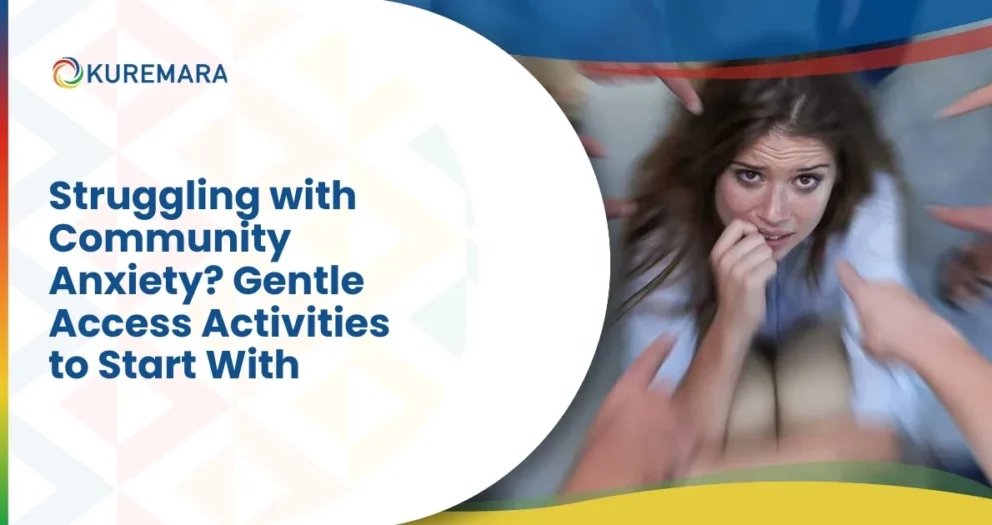The Australian government has taken initiative through a scheme called the National Disability Insurance Scheme (NDIS) to provide support and services for individuals with severe and profound disabilities. This scheme was launched in 2013 with an aim to improve the quality of life for disabled people by funding any kind of support they might need. The management of this scheme falls under the National Disability Insurance Agency (NDIA). Under this scheme, over 80000 children are included among the disabled Australians who receive support. Kuremara is the Registered NDIS Provider that enables independence and better support through its services.
Therapy by NDIS includes therapeutic support received through funding given under the NDIS for participants to achieve their personal goals and independence. This is part of Capacity Building Supports at NDIS, which it aims to help its participants build the skills and independence.
There are important benefits that NDIS Therapy brings out to contribute to the general well-being of participants. Among others include:
-
- Improved Independence
-
- Enhanced Communication
-
- Better Mental Health
-
- Increased Participation
Understanding the NDIS
The National Disability Insurance Scheme is an Australian government fund that provides funding and support to people who have highly significant and permanent disabilities.
To be eligible for NDIS support, people should meet the following criteria:
-
- Aged between 7 and 65 years.
- An Australian citizen, permanent resident, or holder of a Protected Special Category Visa.
- Have a permanent and significant disability that severely limits their ability to participate in daily activities.
In some cases, applicants may be eligible if they also require early intervention that would reduce their requirements in the future.
The NDIS is based on individualised funding and support plans specific to each participant’s needs and personal aims. The eligible individuals apply to the NDIS. Upon acceptance, participants collaborate with a NDIS planner to develop their personal plan. Funding is determined based on the crafted plan. He or she will manage plans, either self-managed, plan-managed, or through the help of NDIA. Plans are normally reviewed regularly to see whether they continue to meet the participant’s goals and objectives.
NDIS is a flexible scheme, providing innovative support for people with disability to lead richer lives.
What Is NDIS Therapy?
NDIS Therapy actually encompasses all treatments that the NDIS funds to help participants achieve their personal goals to ensure maximum independence for themselves. These are meant to be a combination of therapies working on various grounds of a participant’s life-physical, mental, and social wellbeing of participants.
The therapies that NDIS provides are generally made of many types of treatments to cater to varied needs of participants. Some main types include the following:
-
- Occupational therapy
-
- Physiotherapy
-
- Speech therapy
-
- Psychological therapy
-
- Music and Art therapy
-
- Dietitian services
-
- Exercise Physiology
How Does NDIS Therapy Fit into the NDIS Framework?
Therapy is a core component of the NDIS framework, aimed at supporting participants to meet their individual goals and live more independently. At Kuremara, we assist our participants in accessing the right therapy services that align with their goals, whether that’s improving mobility, communication, or mental health.
The Role of Therapy in Disability Management
 Therapy is of the utmost importance in the management of disabilities because it allows for holistic interventions with the aim of supporting change and improvement in the life quality of an individual. Some of the most important roles of therapy in the management of disabilities include the following:
Therapy is of the utmost importance in the management of disabilities because it allows for holistic interventions with the aim of supporting change and improvement in the life quality of an individual. Some of the most important roles of therapy in the management of disabilities include the following:
-
- Improved Independence: Occupational and physiotherapy enable participants to handle daily activities more with independence.
- Improved Communication: Speech therapy facilitates interacting well with others, which leads to social contact.
- Mental Health Support: It enhances emotional wellbeing through psychological therapies that aim at offering treatment on mental health conditions.
- Facilitation of Participating in the Community: Therapy offers a basis for realising specific needs, through which people get to be a better member in their community and live goals
- Improvement of Physical Health: The services of exercise physiology and dietitian helps control physical health conditions, hence improving wellbeing in general.
The main aim is to support people with any kind of disability with an enriched life. Support would be provided focusing on the specific need and challenge of each individual.
Types of NDIS Therapies Available
 1. NDIS Occupational Therapy – to Live Independently
1. NDIS Occupational Therapy – to Live Independently
This therapy allows individuals to learn and skills about living and working. This involves dressing, cooking, and personal hygiene. Occupational therapists help learners in any lifestyle modifications as they use assistive technology to improve their independence.
2. Physiotherapy – Physical Health and Mobility Improvement
Physiotherapy is a training that improves movement and physical functioning. It utilises exercises, stretches, and manual therapy to enhance strength, flexibility, and mobility
3. NDIS Speech Therapy – Enhancing Communication and Swallowing Functions
This treatment is meant to address verbal communication capabilities and treat swallowing disorders. Speech therapists have patients for speech disorders; these include speech delay, articulation disorder, and dysphagia that is the failure to swallow.
4. Psychological Therapy – Mental Health Support
This therapy allows offering mental illness treatment through cognitive-behavioral therapy, interpersonal therapy, and other kinds of counseling.
Other Specialised Therapies – Art, Music, and Sensory Therapies
Creative and sensory approaches include art therapy, music therapy, and sensory integration therapy. Specialised therapies are intended for the use of creative processes and sensory experience towards the healing within the emotional and psychological aspects.
Benefits of NDIS Therapy for Wellbeing
NDIS therapies that include physiotherapy and exercise physiology maximise a person’s physical wellbeing. These therapies seek to attain strength, mobility, and coordination in the person through personalised exercise programs and manual therapy.
Psychological therapies funded by NDIS greatly contribute toward the support of those who, in reality, suffer from anxiety, depression, and stress. Participants learn coping skills and strengthen their resilience to be able to navigate emotional challenges-which leads to better emotional wellbeing.
Speech therapy and other communication-focused therapies enhance social wellbeing by improving participants’ ability to take full participation in communicating effectively. Such improvements can lead to better social interactions with family, friends, and the general community and result in building stronger connections socially and reducing feelings of isolation.
Therapies such as cognitive behavioral therapy (CBT) and occupational therapy fall in the category of promoting cognitive well-being through equipping participants with skills for daily living and problem-solving. They develop one’s cognitive functions, enhance independence, and let the participants handle their daily tasks better.
How to Access NDIS Therapy Services
There are several steps to access NDIS therapy services. You should first establish that you are an Australian citizen or a permanent resident of Australia with a permanent and significant disability. Then, apply for an Access Request Form to the NDIS. After your NDIS application approval, you will have a planning meeting. The meeting will involve discussing goals with the NDIS about your needs and how you will need support. In this way, funding and services for your NDIS plan will be determined.
One can use the NDIS Provider Finder tool to identify registered NDIS therapists for your area. You can also rely on Local Area Coordinators who recommend from these based on your needs. You can even check the reviews and take recommendations from NDIS participants or support groups.
For an individualised therapy plan, you must specify your particular therapy goals. Then you will be able to work with therapists who may change their strategy according to your development and feedbacks. There must be proper reviewing of your NDIS plan to track the developments and bring about changes in case they are necessary.
NDIS Therapy for Different Age Groups
1. Children and Early Intervention
The NDIS offers key support through Early Childhood Early Intervention, whereby children are assisted before attaining the age of 6 years to have successful entry into therapies that would help equip them with the skills they need and reduce the possibility of later dependency.
2. Therapy for Adolescents
Teenagers are unique during growth; they encounter numerous challenges starting with social, educational, and emotional changes. NDIS therapy for teenagers addresses the unique challenges such as social, educational, and emotional changes to build independence, manage mental health, and develop social skills.
3. Therapy for Adults
NDIS therapy services for adults are goal-focused and aimed at managing long-term health conditions to enable people to achieve their personal goals. Such areas include physiotherapy about movement issues; psychological therapy dealing with mental health disorders; and occupational therapy to enhance participation in everyday activities.
4. Therapy for Seniors
Other advantages that the elderly would gain through accessing NDIS therapy services involve preserving and upholding their quality of life. This would mean receiving NDIS physiotherapy to manage age-related disorders, speech therapy to overcome various communications problems, and assistance in social activities.
Choosing the Right NDIS Therapist
To ensure the right NDIS therapist, you should first of all check that his registration with the Australian Health Practitioner Regulation Agency (APHRA) is current for psychologists and occupational therapists. You would want specialists who provide the specific therapy you require. Also, consider a therapy assistant NDIS who is experienced working with NDIS participants to guide your progress.
You need to find a good NDIS therapist to be able to establish trust and have access to an effective therapy. In all communications, see to it that proper alignment with the therapist best suits your changing needs and preferences.
If you want to change your therapists, let the LAC or NDIS planner know. Report your updated changes to your existing therapist of your decision to change. Then, make use of the NDIS Provider Finder tool or ask your LAC for recommendations to find a new therapist.
Funding NDIS Therapy: What You Need to Know
Funding is available under the NDIS to access diversified supports and services for therapies to eligible participants. Funding will depend only on their needs and goals and will be divided into three essential categories:
-
- Core Supports – Those daily consumable and daily-living activities.
- Capital Supports – Assistive technologies and home modifications.
- Capacity Building Supports – Services that help build skills and independence like therapies.
The NDIS had set price caps on the different therapeutic services in order for participants to get value for the money spent. These capping prices are provided in the NDIS Price Guide that is reviewed from time to time.
To maximise your funding for therapy, work with your NDIS planner or support coordinator to identify your therapy needs and thereby determine your budget. Using registered providers with NDIS gives you assurance that you would be receiving services within standards and requirements of safety stipulated by NDIS. Keep track of your expenditure to be in line with how much you have spent, thus not misappropriating your money for other unintended reasons. Group therapy sessions often save one money to get therapy and it is usually a sure way of gaining peer support.
Common Challenges in NDIS Therapy and How to Overcome Them
The NDIS is one of the most challenging systems to navigate. Here are some tips on how to make things easier:
-
- Seek guidance from the NDIS Planner or support coordinator
-
- Keep up-to-date with updates and policy changes on the NDIS website
-
- Join Support Groups that provide valuable insight and support
The goals of long-term therapy will be achieved with time only if consistency remains the heart and soul of the therapy. You can maintain a regular routine for your therapeutic sessions. Share your changing needs with your therapist.
One should not forget the fact that setbacks are part of the therapy journey. Positivity needs to be maintained to observe improvement. You need to alter your goals by working hand in glove with your therapist. At the same time, you must keep in contact with your friends, support staff to seek motivation and advice.
NDIS Therapy with Kuremara: Local Services and Support
Kuremara is a registered NDIS provider who delivers most services for individual persons who have disabilities. Here is a summary of the local services available:
- Supported Independent Living
- In-Home Support
- Short Term Accommodation
- Community Access
- Community Nursing
- Transport Services
The team at Kuremara ensure that participants and their families or carers engage well with them so that all of their needs and goals are met. They deliver tailor-made support services so that the people they are helping may become empowered and to increase their independence.
The Future of NDIS Therapy
 Disability support is changing fast with rapid technological advancements, policy changes, and a drive for person-centered care. Some of the major trends are as follows:
Disability support is changing fast with rapid technological advancements, policy changes, and a drive for person-centered care. Some of the major trends are as follows:
-
- Technological Advances will make life easier for many with disabilities and offer them more independence at the same time attaining access to support.
- Policy Changes will improve the quality and access of disability support services.
- Person-Centered Support pays consideration to the distinct needs and goals of each participant.
NDIS is researching advanced treatments to deliver greater successes for participants:
-
- AI-based Assistive Technologies: Better support people with more personalised support
- Telehealth Services: House-based treatment sessions are increasingly being adopted too, and people can avail health consultation from the comfort of their own homes.
- Integrated Care Models: This ensures that different types of therapy and support services are combined into a cohesive program that ensures all needs concerning the requirements of a participant are dealt with in an integrated and holistic manner.
These trends and innovations pave the way to a more adequate and supporting future for people with disabilities.
Conclusion
NDIS therapy is one of the significant dimensions through which the overall wellbeing in a person is enhanced. The NDIS gives access to various therapeutic supports so that participants can enhance their functional capacity, independence, and quality of life.
However, if you or people around you are lucky and can secure NDIS support, then pursuing every avenue for therapy would prove to be very useful. In fact, the NDIS framework was designed to equip people with the right support to empower them to help them achieve their personal goals while improving their living situations. Do not hesitate to consult the NDIS planners or support coordinators so they can guide you to make the most of your therapy budget and unlock more resources in support.
 care@kuremara.com.au
care@kuremara.com.au
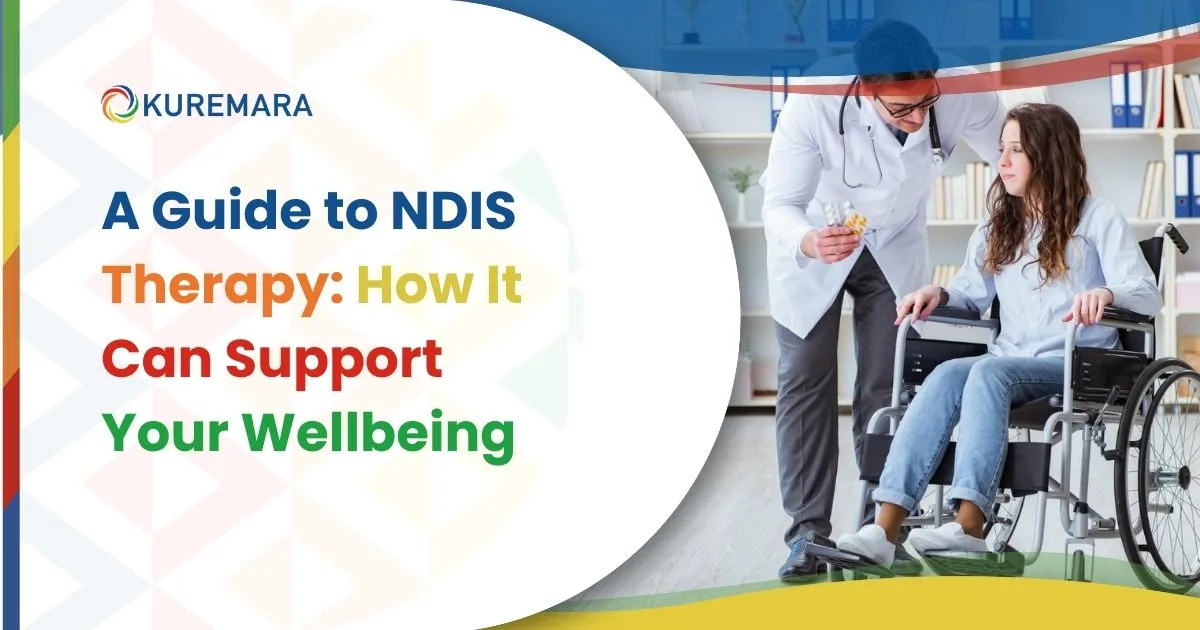
 1. NDIS Occupational Therapy – to Live Independently
1. NDIS Occupational Therapy – to Live Independently

